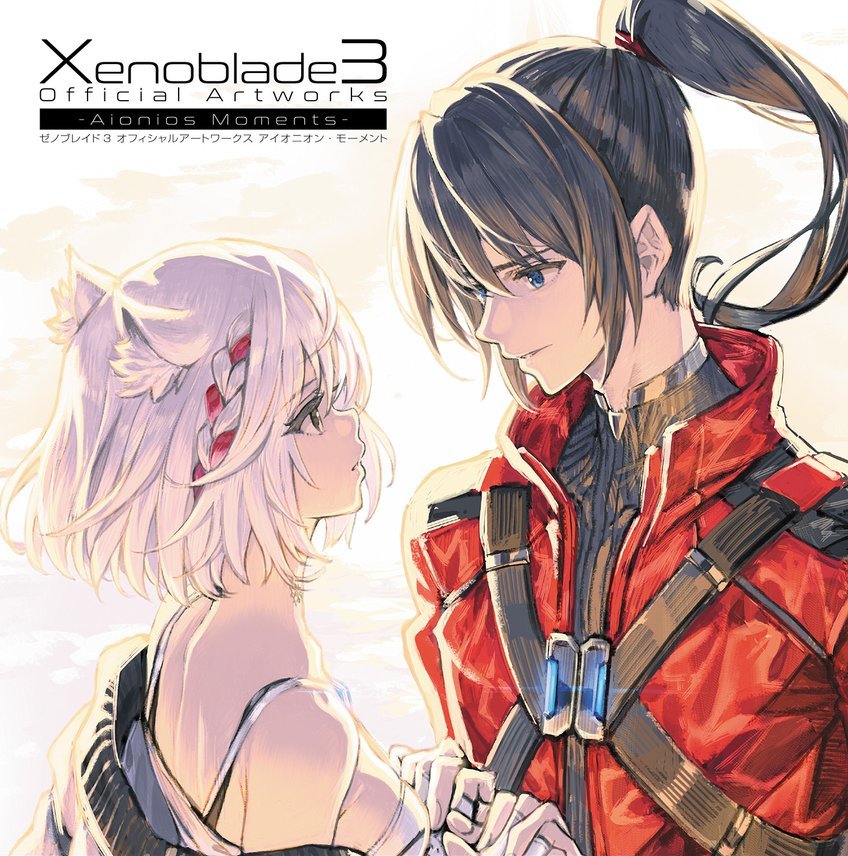[Jesus, I spent like 2 hours writing this and I have so many final exams to prepare for. For anyone who’s willing to read, thank you, and please let me know what you think or call me out on bullshit/leaps of logic. I love how this story played out, not that I don’t have a few issues with it, and I’m so keen for more good discussion.]
I’ve been kinda sad seeing so many Xeno die-hards end up disappointed in XC3 on this forum and elsewhere. I definitely agree that it does things quite differently to the rest of the trilogy, but I ended up with a really different impression.
I was sceptical when the game was announced, since I felt that 1 and 2 had very complete narratives and that a direct sequel could end up feeling cheap or contrived, rather than making something wholly new. But, I was pleasantly surprised: I think it was a brilliant response to the themes and questions left by the other games, and I am incredibly impressed by how contemporary it is, how overtly political it is, and how sincerely it seeks to have a relevant message for the times we live it.
Don’t worry, my response is not going to be ‘but the characters are really good’, since most of us already agree on that. I think there is much more to the plot that makes it a fitting conclusion.
I think in addressing how it serves as a conclusion to the trilogy we have to ask:
‘What questions did 1 and 2 address, and what questions are left to ask?’
XC1 and XC2 both had pretty conclusive endings. 1 is set in a world where everything is metaphysically predetermined and concludes in the creation of a world “with no gods.” 2 is optimism vs nihilism in the face of human cruelty. Klaus and Amalthus both give up on the world, and Malos manifests (through the same metaphysical power in 1) as the logical conclusion that it therefore should be destroyed, and Rex is the counterpoint who fights for forgiveness and for humans to have the chance to keep on trying.
Against predetermined fate or denial of a right to exist, 1 and 2 basically ask the same question: ‘do we deserve to choose our own future?’ Shulk’s defiance and Rex’s optimism prove the answer ‘yes’. Question answered.
There’s no point in asking that question again. Instead, XC3 deals with the aftermath: the question, ‘
what does it mean to be able to choose your own future, to grapple with those possibilities?’ 3 takes the stance that this is a
terrifying question. There is no higher power accountable for the future after 1 and 2: no gods, no Conduit; only humans themselves. For the main characters who have fought for that right, it is a great success. However, it is humanity as a whole who now bears this responsibility.
I think this is a brilliant, even
crucial question to address in a successor to 1 and 2, and that’s why I really can’t agree that “this is not what the series had built up.”
Now I want to talk about the assertion that:
XC3 doesn’t engage with its themes, that it just ‘rattles them off like a philosophy class syllabus’, and that in regards to Xeno’s “philosophical legacy it’s a failure.”
I’d love to know which themes people think it doesn’t engage with, or which aspects of the legacy it fails, so I hope to hear about that in more discussion, but for now I’ll talk about how I believe this isn’t the case.
So Origin is built to avert the mutual destruction of the universes, and to do that it has to contain all living consciousnesses inside it. An unknown future is arriving, and people are terrified of it—a natural response is simply to freeze, to pray that the moment won’t come. Thanks to the workings of Origin, that wish manifests Z, who stops the process. I think the following bit of dialogue from chapter 7 sums this up excellently.
It’s banal, even naïve. The fact that Z and Moebius do not have a grand ambition or mission to accomplish is what makes them such effective villains to me. They simply want to keep comfortable and do the same thing forever. Another line that I think encapsulates what Z thinks is the appeal of his world is this from the end of chapter 3.
I understand how this might seem to be a less compelling antagonistic force than 1 and 2, and certainly Z
does less in the plot. However, I think this quote of Takahashi’s candidly communicates what he was going for this time.
Jin and Malos are extraordinary antagonists, and each makes the other more compelling (and actually, in isolation they wouldn’t have been nearly as good), but they are definitely this classic kind of ambiguous villain. I think XC3 works explicitly as a story about life and society in a modern sense, and the villains in real life
aren’t those tragic ambiguous figures—they’re billionaires and corporations, systems of power in glorious global hegemonic capitalist liberalism, occasionally with a veneer of democracy.
Now, I know that statement suggests something of a strong left-wing attitude in this writing, and that’s true, but I’m also not just using these as buzzwords. The people who maintain these cycles of exploitation aren’t doing so out of a sadistic desire for destruction—they’re doing it to maintain their own comfort, to continue
having more than anybody else. In essence, to keep everything exactly the same. So XC3 is
not a story about war. It’s a story about life.
The brilliant metaphor of the flame clocks is what links the war setting to the capitalist analogy—a constant, artificial struggle to survive. The only way to live is to exploit others, who must exploit you in order to live. If you’re better at killing, you get better food and bedding and ascend a gamified hierarchy. But it’s an illusion; the efforts of both sides only exist to maintain the privileged, unchanging lifestyle of the Consuls. The contradiction ‘fighting in order to live and living to fight’ almost exactly mirrors Umberto Eco’s ninth feature of fascism:
This theme is pervasive throughout the main story and side quests, the latter of which I’ll discuss briefly now.
Whenever a colony flame clock is broken it’s like a micro-version of the endings of XC1 and XC2—suddenly, the endless need to fight goes away, and people are left to face their own future, wondering ‘so what now?’ Some people have ideas, some are aimless, some resist. But these side quest chains do go to show in diverse ways how people can learn to live outside an exploitative system. Zeon’s drive to establish subsistence farming is a slog, but I think it’s appropriate:
it is not easy to live outside a system that is all you’ve ever known and which has existed for centuries. In all of them, the journey is made easier by learning to work together: Colony Iota is a great example in adapting the tools they used for warfare and exploitation into tools for mutual aid, which is cited directly in the games text. (And for the record in one of the Iota quests Eunie
literally quotes Karl Marx).
Some critique of the side quests is that colony soldiers accept the lack of the flame clock way too quickly, and it’s true that they don’t show a lot of resistance. But I think it’s natural—these people do not know that life can exist outside these bounds, and Moebius takes the task of keeping them in the dark
extremely seriously. They do this because fundamentally, Moebius has a weak case—they were born out of panic and anxiety; they need absolutism because their philosophy doesn’t hold up to critique. This is also why pacifism is immediately punished, why Noah and the party are attacked as soon as they return to Colony 9—if even the idea got out that not fighting was an option, it’s a major risk.
I have one last point to make.
Regarding ‘the sci-fi twist that upends your understanding of the story’
Those moments in past Xeno games where the façade gets stripped away, where the high-concept sci-fi-onto-philosophical truth behind existence and origin of the world gets revealed and blows your mind, are undoubtedly some of the highlights and definitely what made me become a fan when I was younger. And I think it’s fair to say that XC3 does not have a twist like this, whether at the middle or at the end.
However, I think there is an equivalent moment in the arrival to the city. All of those mind-blowing moments from before are mind-blowing both to the player and to the characters. The revelations at the city—childbirth, ageing, the concepts of ancestry, history, culture—are obvious to us, but absolutely foreign and assuredly mind-blowing to the characters. Yes, we don’t get blown away by an elaborate, creative sci-fi concept. Yes, it’s another example of a classic Xeno twist replaced by an emotionally resonate moment. Nevertheless, this section is
paramount for the thematic through-line of the game. In order to face the future, there must be acknowledgement and awareness of the past.
It's crucial that, aside from the city, Aionios has no history and barely any culture. The remnants of Alrest and Bionis/Mechonis are completely unrecognised, and diverse races of people don’t even realise that they’re different beyond the manufactured nationalism indoctrinated in them by Moebius. It’s unsatisfying for us, who do understand the significance of these details—that’s what’s so tragic! This is the ‘endless now’: no need for past, no need for future.
The condition of Z’s existence is that he believes he is
absolutely right. Anyone who stands against him dies or gives up. I often see “because it amuse me” woefully misinterpreted—Z didn’t create Aionios, rebirth, endless war and such because its amusing. All of those things are the case because they enable an endless stasis—because
they should be the case. The thing that amuses Z is when people attempt to deny it. Crys decides he’s satisfied with his life and chooses to die. Joran finds contentment rather than regret when he saves Lanz. Z is amused because when he offers eternity to those people who had made peace with the finitude of life, they accept. They always accept—and
that is what’s amusing.
Most significant in this regard are Noah and Mio, who fight Z over and over again across multiple lives. Eventually they abandon that goal, have a child, and die ‘natural’ deaths. Noah, who was Z’s greatest threat, accepts eternity as well. It crushes him but affirms Z’s belief.
Anyone will choose this in the end.
However, we infer (I can’t remember if it's explicit) that N’s and M’s child, or a descendant, goes on to found house Vandham. Centuries pass, and eventually one of Noah and Mio’s
own descendants is the one who saves them in chapter 1 and sets them on the path to free the world. Even as N succumbs to Z, he and M set that process in motion.
In a similar way, off-seeing is the one way soldiers of Aionios maintain a connection to the past and hope for a future—a practice which is started by Crys with M’s support and is eventually passed down to Noah.
The Ouroboros we control only succeed because of actions set in motion over a thousand years before, a slowly-building rebellion against Moebius’s eternity of control. And this passing-down is symbolised in the music of the protagonists and the history of the city. In the final boss fight when Z, having abandoned his smooth rhetoric, says “the self is all that exists”, he has already been proven wrong.
Then the ending, where Aionios with its tenuous, fleeting history is annihilated and the worlds reverted to the instant before their collision. The condition of the world is exploitation and stasis—the story seems to tell us that the flow of slaughter and reincarnation is what allows Origin to keep time slowed. The city and the liberation of the colonies has created a lot of goodness in Aionios too, but unfortunately the fusion of the universes is conditional on the flow of life, on the cycle of reincarnation. We can say “why does it have to be that way?” but we might also say “why can’t we have iphones without slave labour”, or, broadly, “why can’t we fix things without losing anything?”
XC3 asks you to confront this question in a way that a lot of current media doesn’t. It isn’t willing to provide an easy way out. But with the same breath, it is constantly, profoundly
hopeful. Plenty of games handle ‘mature themes’, but so often nihilism is the result. Xeno-games have always adamantly rejected nihilism, which is a quality I didn’t appreciate as much as I should have in the past.
This is how it completes the ‘Klaus saga’, in my view. Human fallibility caused the violent split of these universes. In each, the people fought for the right to choose their future. Eventually they became free. The reunification and mutual annihilation of the worlds is the unavoidable consequence of the past, and Moebius gives the easy answer of shutting your eyes, pretending the past didn’t happen, pretending the future isn’t coming. Which achieves nothing but a slow, drawn-out demise. The progression is symbolic in N/M and Noah/Mio’s Irises.
- The Moebius strip: a surface on which you keep moving infinitely, fast or slow as you like; you’ll always be in the same place.
- Ouroboros: still cyclical, but there is an undeniable point of change between the head and the tail. This isn’t a solution, but it is proof of the fundamental contradiction in Moebius, the proof of finitude (within the infinity of time).
- When Noah and Mio reconnect with their other selves, the merged symbols become a yin/yang, a symbolic of naïve dialecticism. It gives an answer to the contradiction of eternity: to embrace impermanence, and accept that change will happen, endlessly.
I think that, in the end, XC3 wants to ask: ‘Could you abandon things you love in order to face the future? Would you think that’s the right thing to do? Even if the future is uncertain, even if you might not exist anymore? Could you do it?’
It’s a question that, when I really get into it, I struggle to answer. But I think it is a question of utmost importance for the times in which we live.







